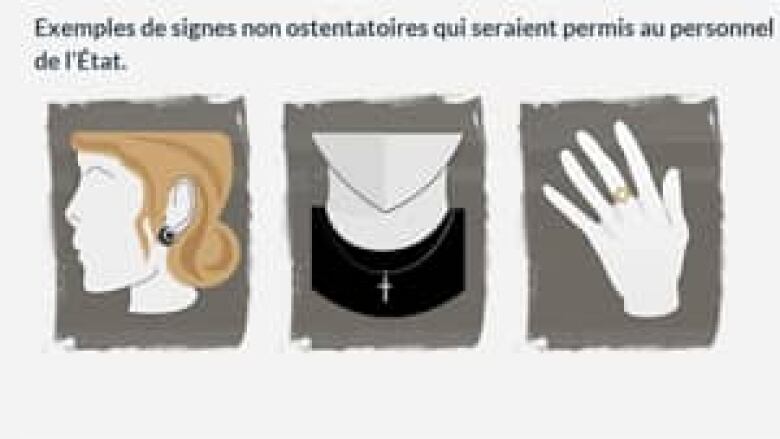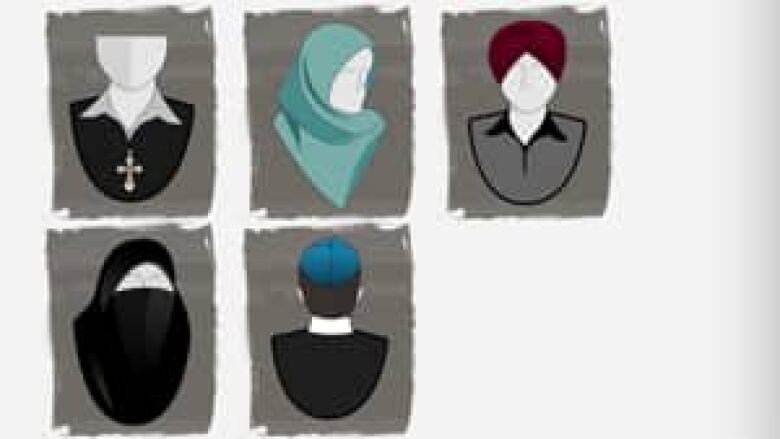Quebec values charter backed by public sector union
SFPQ president says religious symbols equivalent to expressing political beliefs

One of Quebec's main civil service unions is backing the Parti Qubcois' controversial proposal to prohibit overt religious symbols in the public service.
The Syndicat de la fonction publique et parapublique du Qubec (SFPQ), which has 42,000 members, said itapplauds the government for ensuring religious neutrality.
SFPQ union president Lucie Martineau said rules enshrining religious neutrality in the public service are long overdue.
- 5 things Quebec's values charter would do, and 5 it wouldn't
- Charter of Quebec values would ban religious symbols for public workers
- Q&A: Quebec's religious garb debate intensifies
Public employees would not be allowed to wear overtly religious symbols at work under the proposed charter of Quebec values, the details of which were released by the governing Parti Qubcois Tuesday.
That includes thewearing of kippas, turbans, burkas, hijabs and "large" crosses by civil servants while they are on the job.
Elected members of the national assembly would not be subject to the regulations.
At a news conference this morning in Quebec City, Martineau said many employees have expressed concern over being asked to make religious accommodations on the job.
The charter proposalincludes five elements:
An amendment tothe Quebec Charter of Human Rights and Freedoms.
Establishment of a duty of neutrality and reserve for all state personnel.
Limitations on the wearing of conspicuous religious symbols.
Prohibition on having one'sface uncovered when providing or receiving a state service.
Establishment ofan implementation policy for state organizations.
Critics of the proposed prohibitionshave expressed concernthat some employees might be fired if they refuse to remove symbols such as the hijab or the kippah.
Martineau disagreed, comparing the proposed ban to the current rules preventing any employee from expressing a political belief on the job.
She said no one has ever been fired under those rules.
"We're obliged to keep our political opinions to ourselves," said Martineau.
"We want that extended to our religious opinions."

Wednesday morning, Premier Pauline Marois, in her first public comments since the plan's release, said she's pleased with the government's plan. She said she now welcomes the upcoming debate.
"I'm very proud of the charter, the proposal we issued," the premier told reporters on her way into a cabinet meeting.
"The debate is open now. People have the right to express themselves. It's been on a few hours, vigorously, but I hope the debate will be done as serenely as possible. Because I think we need to set clear guidelines for how we live together."

'Powerful discrimination'
However, theman who helped lead Quebec's commission on reasonable accommodation says the PQ's proposals go too far.
Charles Taylor told CBC Montreal's Daybreak this morning that charter could have a significant and lasting impact on the province.
"They arent really Quebec values Quebec values, as it turns out, are very much in line with the universal values about this, which include things like no discrimination," he said. "In actual fact, under the cover of Quebec values, were going to operate a very powerful discrimination.
"This sends a message to people that belong to that kind of religion: dont come here," he said.
'We're obliged to keep our political opinions to ourselves ... We want that extended to our religious opinions." Lucie Martineau, SFPQ president
Taylor spent months travelling the province in 2007,listening toQuebecers as part of the commission he co-chaired on the reasonable accommodation of religious and cultural beliefs.
The300-page report that resulted from those hearings, released in 2008, emphasized that Quebec has moved from a singular French-Canadian identity to a more encompassing societal understanding of citizens of the province.
The report called on the province to define its secular nature and develop greater measures to counteract discrimination. However, it also emphasized that accommodation shouldnt be overly legislated.
Five years later, Taylor says the charter as proposed doesnt accomplish the goals laid out in the reportthat and only superficially addresses the issue of state neutrality.
"We said in our report that neutrality of the state depends on what the government does. It depends on the actual policies," he said.
"Because theyre making these appearances so important, theyre actually no longer neutral, in fact, because theyre saying, If you belong to one of these visible religionsyou cant work in the public sector unless you renounce your religion."
Everyone else, Taylor said, can do so without amending their beliefs, and that amounts to discrimination.
He said the proposed regulations could alienate religious communities and drive a wedge between Montreal and the rest of the province.
The consequences, Taylor said, will be "disastrous in all sorts of ways."
Though no timeline has been announced, the bill is expected to be tabled sometime in the coming months.
With files from The Canadian Press












_(720p).jpg)


 OFFICIAL HD MUSIC VIDEO.jpg)
.jpg)



























































































